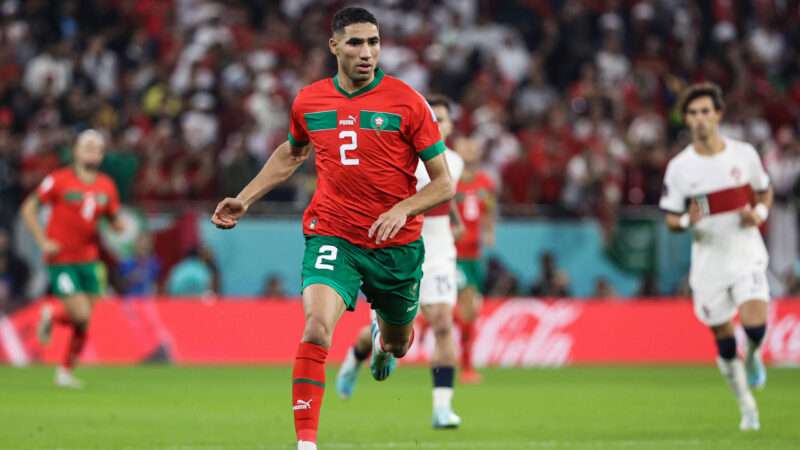
The biggest story of this year's World Cup has been the incredible underdog run by Morocco, which will be the first African team to ever play in the semifinals of the globe's biggest sporting event when the Atlas Lions kick off this afternoon against the defending champions from France.
"We are the Rocky Balboa of this World Cup," Walid Regragui, the team's French-born head coach, said after Morocco's stunning upset of Portugal in the quarterfinals.
Even though events like the World Cup and the Olympics are often thought of as quirky celebrations of nationalism, Morocco's run through this World Cup highlights the essential role that immigration plays in building strong nations—and strong national football teams.
In fact, more than half of the players on Morocco's roster for the World Cup were born in other countries. That's the highest percentage among all 32 teams that kicked off the tournament in Qatar last month, according to a breakdown by Quartz.
Without the contributions of those immigrants, it's a near certainty that Morocco wouldn't still be playing. Indeed, it was Achraf Hakimi who scored the game-winning penalty kick in Morocco's shoot-out win against Spain; Hakimi was born in Madrid. Hakim Ziyech, whose outstanding play in the midfield was key to Morocco's upsets against Portugal and Belgium (and who scored another penalty kick against Spain), was born in the Netherlands.
Did those foreign stars take football-playing jobs from native-born Moroccans? Sure. And is the country doing better as a result? Absolutely. And there's probably a lesson there that goes beyond the soccer field.
Morocco might be ahead of the curve when it comes to relying on foreign-born talent for footballing success, but it is hardly alone. An analysis by Vox found that 16.5 percent of the players in this World Cup are representing countries other than where they were born—the largest percentage in the tournament's history.
Talent flows in all directions. European-born players are making their mark for Morocco and other African teams—there are 59 French-born players at the World Cup, and 56 percent of them are playing for African teams, according to Quartz—while African immigrants and their descendants are now leading top European teams. Breel Embolo, who was born in Cameroon but plays for Switzerland, scored against his birth country in their first-round match (and refused to celebrate the occasion). Kylian Mbappé, the 23-year-old superstar who has already scored five goals for France during the tournament, is the son of Cameroonian immigrants.
National teams are able to recruit players from beyond their own borders because FIFA's rules don't require citizenship as the sole qualification. Instead, players are eligible to represent the nation where they were born, any nation where they have become naturalized citizens, or any nation of their parents' or grandparents' birth. Though players might be eligible to play for a variety of national teams, they cannot switch mid-career: once you play a game for one national team, you're locked into that choice (unless the nation breaks up, like Yugoslavia did in the 1990s).
It's not the full-on open borders of libertarian dreams, of course. But as displays of nationalism go, the World Cup operates under an immigration policy that's pretty fantastic.
And one that yields thrilling results on the field. For example, Canada's first-ever World Cup goal was scored last month by Alphonso Davies, who was born in a refugee camp in Ghana after his parents fled civil war in Liberia. Stricter immigration policies (by Canada or FIFA) would have denied Davies the opportunity to excel, denied Canada a chance to field its best player ever, and denied fans the thrill of watching it all happen.
The contributions of immigrants are usually far less obvious and less celebrated than they are at the World Cup, but that doesn't make them any less important. Immigrants are more likely to start businesses and create jobs than native-born Americans, for example. On a per-capita basis, immigrants consume less welfare and entitlement benefits than native-born Americans.
Nevertheless, nationalists who hold significant sway within the so-called "New Right" want to limit immigration because they see immigrants as unwanted competition for native-born Americans' jobs and welfare. Or they worry about how immigration will change the existing culture. But the World Cup demonstrates that immigrants contribute to national pride, not ruin it. Are any Moroccans going to be upset if Spanish-born Hakimi scores today? Would French football fans rather see Mbappé playing for Cameroon? Of course not.
It might also be worth noting that Hungary, which nationalists idealize in part because of President Viktor Orban's strict immigration policies, didn't come close to qualifying for the World Cup.
On the stage of international football, national borders will always matter. But the liberalized rules that increase competition for the best players and create new opportunities for skilled immigrants could serve as a model for how to think about immigration in other contexts. Nations should behave more like welcoming brands who want to recruit the best available talent, and less like gatekeepers.
Morocco probably won't win the World Cup, but they've provided a powerful lesson in how to build a stronger nation: let other people in.
The post Morocco's Incredible World Cup Run Is a Victory for Open Borders appeared first on Reason.com.







